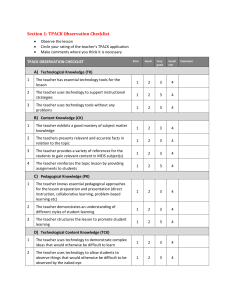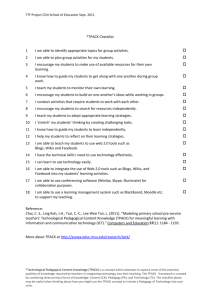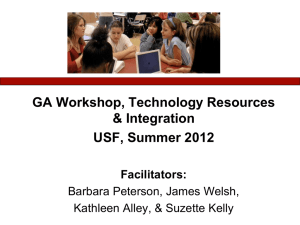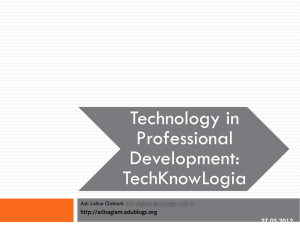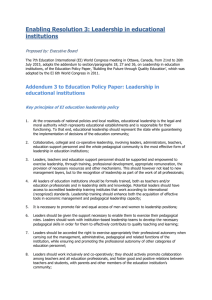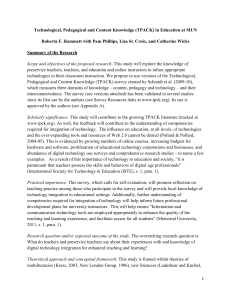Technological Pedagogical and Content Knowledge (TPACK) of
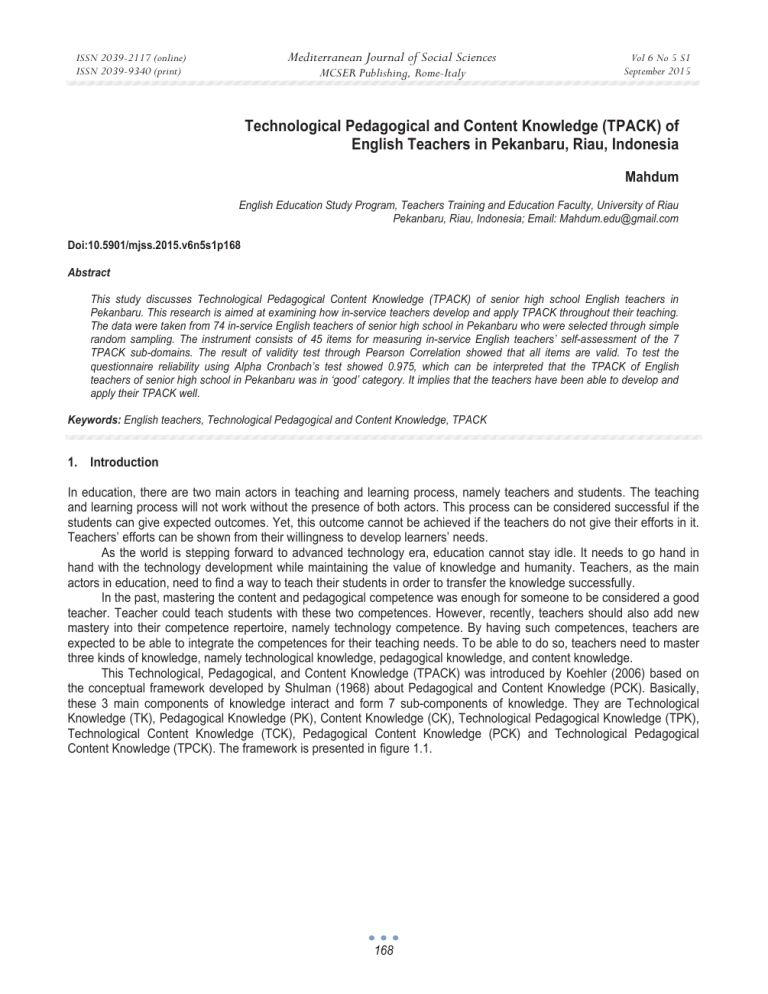
ISSN 2039-2117 (online)
ISSN 2039-9340 (print)
Mediterranean Journal of Social Sciences
MCSER Publishing, Rome-Italy
Vol 6 No 5 S1
September 2015
Technological Pedagogical and Content Knowledge (TPACK) of
English Teachers in Pekanbaru, Riau, Indonesia
Mahdum
Doi:10.5901/mjss.2015.v6n5s1p168
Abstract
English Education Study Program, Teachers Training and Education Faculty, University of Riau
Pekanbaru, Riau, Indonesia; Email: Mahdum.edu@gmail.com
This study discusses Technological Pedagogical Content Knowledge (TPACK) of senior high school English teachers in
Pekanbaru. This research is aimed at examining how in-service teachers develop and apply TPACK throughout their teaching.
The data were taken from 74 in-service English teachers of senior high school in Pekanbaru who were selected through simple random sampling. The instrument consists of 45 items for measuring in-service English teachers’ self-assessment of the 7
TPACK sub-domains. The result of validity test through Pearson Correlation showed that all items are valid. To test the questionnaire reliability using Alpha Cronbach’s test showed 0.975, which can be interpreted that the TPACK of English teachers of senior high school in Pekanbaru was in ‘good’ category. It implies that the teachers have been able to develop and apply their TPACK well.
Keywords: English teachers, Technological Pedagogical and Content Knowledge, TPACK
1.
Introduction
In education, there are two main actors in teaching and learning process, namely teachers and students. The teaching and learning process will not work without the presence of both actors. This process can be considered successful if the students can give expected outcomes. Yet, this outcome cannot be achieved if the teachers do not give their efforts in it.
Teachers’ efforts can be shown from their willingness to develop learners’ needs.
As the world is stepping forward to advanced technology era, education cannot stay idle. It needs to go hand in hand with the technology development while maintaining the value of knowledge and humanity. Teachers, as the main actors in education, need to find a way to teach their students in order to transfer the knowledge successfully.
In the past, mastering the content and pedagogical competence was enough for someone to be considered a good teacher. Teacher could teach students with these two competences. However, recently, teachers should also add new mastery into their competence repertoire, namely technology competence. By having such competences, teachers are expected to be able to integrate the competences for their teaching needs. To be able to do so, teachers need to master three kinds of knowledge, namely technological knowledge, pedagogical knowledge, and content knowledge.
This Technological, Pedagogical, and Content Knowledge (TPACK) was introduced by Koehler (2006) based on the conceptual framework developed by Shulman (1968) about Pedagogical and Content Knowledge (PCK). Basically, these 3 main components of knowledge interact and form 7 sub-components of knowledge. They are Technological
Knowledge (TK), Pedagogical Knowledge (PK), Content Knowledge (CK), Technological Pedagogical Knowledge (TPK),
Technological Content Knowledge (TCK), Pedagogical Content Knowledge (PCK) and Technological Pedagogical
Content Knowledge (TPCK). The framework is presented in figure 1.1.
168
ISSN 2039-2117 (online)
ISSN 2039-9340 (print)
Mediterranean Journal of Social Sciences
MCSER Publishing, Rome-Italy
Vol 6 No 5 S1
September 2015
Figure 1.1.
Framework of Technological Pedagogical and Content Knowledge
(Mishra and Koehler, 2006)
TPACK should be acquired and mastered by the teacher for effective and efficient teaching and learning process.
Concerning with this need, there has been an effort of maintaining TPACK in some particular science subjects in
Pekanbaru, such as in Biology, Chemistry, etc. A study relating to this is even conducted to describe how Biology teachers in Pekanbaru integrate their teaching with TPACK (Suryawati and Hernandez, 2014). The result of the study shows that the mean score of TPACK of Biology teachers in Pekanbaru is 3.79, which means that their TPACK is relatively ‘good’.
However, there seems lack of effort in maintaining TPACK for language teaching in Pekanbaru, especially in
English subject. Therefore, in this study the writer would like to scrutinize the TPACK of in-service English teachers in
Pekanbaru through their self-assessment of TPACK itself in order to answer the following research question: How do inservice teachers in Pekanbaru develop and apply TPACK throughout their teaching? The result of this study is expected to give valuable contribution in describing how teachers develop and apply TPACK in their teaching.
2.
Research Methodology
This research is aimed at examining how in-service teachers develop and apply TPACK throughout their teaching. As part of this research, the writer constructed the survey of teachers’ TPACK to collect the data on their self-assessment upon 7 sub-domains of TPACK, including Technological Knowledge (TK), Content Knowledge (CK), Pedagogical
Knowledge (PK), Pedagogical Content Knowledge (PCK), Technological Content Knowledge (TCK), Technological
Pedagogical Knowledge (TPK), and Technological, Pedagogical and Content Knowledge (TPACK). The survey is designed for English teachers.
Instrument used in this study is in the form of questionnaire adapted from Schmidt et a l. (2009) and Sahin (2011).
The instrument contains of 45 items for measuring in-service English teachers’ self-assessment of the 7 TPACK subdomains. It consists of 14 TK items, 4 CK items, 7 PK items, 4 PCK items, 4 TCK items, 9 TPK items, and 3 TPACK items. The answer for each item is based on five-level Likert Scale:
1.
Strongly disagree
2.
Disagree
3.
Neither agree nor disagree
4.
Agree
5.
Strongly agree
The purpose of the instrument is to measure teachers’ self-assessment of the TPACK domains. Moreover, some questions for gaining respondents’ demographic information are also included in the instrument. The data was taken from
74 in-service teachers of senior high school in Pekanbaru who were selected through simple random sampling.
The instrument’s validity and reliability was assessed using Pearson Product Moment Correlation and Cronbach’s
Alpha test. Result of validity test through Pearson Correlation showed that all the items are valid. To test the questionnaire reliability through Cronbach’s Alpha test, 0.975 was obtained. The data of this study were analyzed descriptively. The data were collected with respect to respondents’ consent.
169
ISSN 2039-2117 (online)
ISSN 2039-9340 (print)
Mediterranean Journal of Social Sciences
MCSER Publishing, Rome-Italy
Vol 6 No 5 S1
September 2015
3.
Research Findings and Discussions
3.1
Profile of In-service English Teachers in Pekanbaru
Based on the data collected, the profile of In-service English Teachers in Pekanbaru is presented in the following table.
Table 3.1.1.
Respondents’ Profile based on Educational Background
Educational Background
Diploma
Undergraduate
Master
Total
Number
0 (0.00%)
59 (79.73%)
15 (20.27%)
74 (100%)
As stated in the regulation of Ministry of Education No. 16 Year 2007, the minimum academic qualification for teachers is
Diploma IV (D-IV) or equivalent to Undergraduate Degree (S-1). Table 3.1.1. shows that most respondents have undergraduate degree as their educational background. None of them is in Diploma. Even, 15 respondents (20.27%) have already had Master’s degree. It shows that in-service English teachers for senior high schools in Pekanbaru have fulfilled the qualification set by the government in terms of academic qualification.
Table 3.1.2.
Respondents’ Profile based on Teaching Experience and Certification
Teaching Experience
10 Years
11 – 20 Years
21 – 30 Years
30 Years
Total
Certification
Yet
6 (8.11%)
57 (77.03%)
9 (12.16%)
1 (1.35%)
73 (98.65%)
0 (0.00%)
1 (1.35%)
0 (0.00%)
0 (0.00%)
1 (1.35%)
Sum
6 (8.11%)
58 (78.38%)
9 (12.16%)
1 (1.35%)
74 (100.00%)
Table 3.1.2. shows that only 1 teacher (1.35%) has received certification. In other words, almost all teachers (98.65% of respondents) have been certified. According to Mulyasa (2012), certification is one of ways to maintain teachers’ competency and professionalism. Therefore, most English teachers in Pekanbaru are certified English teachers.
Table 3.1.3.
Respondents’ Profile based on Age and IT Course
Age Range
35 Years old
36 – 45 Years old
46 – 55 Years old
>55 Years old
Total
IT Course
Ever
3 (4.05%)
8 (10.81%)
0 (0.00%)
0(0.00%)
11 (14.86%)
Never
3 (4.05%)
50 (67.57%)
10 (13.51%)
0 (0.00%)
63 (85.14%)
Sum
6 (8.11%)
58 (78.38%)
10 (13.51%)
0 (0.00%)
74 (100.00%)
Table 3.1.3. shows that most respondents (85.14%) have never joined an IT course. Only 14.86% of them have joined it.
Since technology can be learned either by course or by self-learning, the data cannot determine their IT capacity. Their technological knowledge, then, is assessed through their answers in the questionnaire given.
Overall, based on the profile obtained, most English teachers in Pekanbaru have relatively good qualification. It indicates that they have good capability in applying Technological Pedagogical and Content Knowledge (TPACK).
3.2
TPACK Profile of In-service English Teachers in Pekanbaru
3.2.1
Technological Knowledge (TK)
Nowadays, technology is a very essential tool. Its presence for supporting teaching and learning process has become a
170
ISSN 2039-2117 (online)
ISSN 2039-9340 (print)
Mediterranean Journal of Social Sciences
MCSER Publishing, Rome-Italy
Vol 6 No 5 S1
September 2015 topic for more than a decade (Cunningham and Stewart, 2003). Therefore, teachers are expected to, at least, have basic technological knowledge. In terms of basic technological knowledge, teachers are expected to know some sort of operating system and hardware, and be able to operate some software like wordprocessor, spreadsheet, browser, etc.
Based on data obtained, Technological Knowledge (TK) profile of English teachers in Pekanbaru is presented in table 3.2.1.
Table 3.2.1.
TK Score of English Teachers in Pekanbaru
No. Statement
1. I know how to solve my own technical problems.
2. I can learn technology easily.
3. I keep up with important news technologies.
4. I frequently play around the technology.
5. I know about a lot of different technologies.
6. I have the technical skills I need to use technology.
7. I know about basic component of computer.
8. I know how to use word processing program.
9. I know how to use spreadsheet.
10. I know how to use presentation program.
11. I know how to use printer, scanner, projector, and digital camera.
12. I can save data in digital media
13. I use internet as communication media.
14. I use internet as my teaching source.
Total
3.45
3.69
3.74
3.84
3.80
3.64
3.93
4.14
Mean Remark
4.45
Very Good
3.99
3.92
Good
Good
Good
Good
4.01
3.89
4.04
Good
Good
Good
Good
Good
Good
Good
Good
Good
3.90
Good
Table 3.2.1. shows that the mean of TK scores of English teachers in Pekanbaru is in ‘good’ category. It implies that the teachers have already had basic knowledge about technology and have good ability in using them. It is expected that this ability can be used in their teaching since it is very useful for their lesson preparation, networking and professionalization
(Purcell et al., 2013).
The highest mean score is in overcoming technical problems of computer (4.45). It implies that they are able to solve their own technical problems dealing with computers. As a digital tool, computer is designed adjustable. It sometimes has to be adjusted to our needs, such as installing new software, fixing errors, etc. therefore, by having this knowledge, teachers are expected to be able to fix their own technical problems and to adjust the technology they have for their teaching needs.
English teachers in Pekanbaru have a positive response toward technology development. It is a good thought, since technology evolves and always changes (Mishra and Koehler, 2006). As teachers are one of main actors of education, they have to have the ability in learning and adapting the evolution of technology.
3.2.2
Content Knowledge (CK)
Content Knowledge (CK) is knowledge about subject matter to be taught or learned (Mishra & Koehler, 2006). It is in line with Shulman’s statement saying that Content Knowledge deals with concepts, theories, ideas, framework, knowledge of proof, and practices as well as approaches to develop the knowledge itself (Shulman, 1986).
Based on data obtained, Content Knowledge (CK) profile of English teachers in Pekanbaru is presented in table
3.2.2.
Table 3.2.2.
CK Score of English Teachers in Pekanbaru
No. Statement
1. I have sufficient knowledge about literacy.
2. I can use a literary way of thinking.
3. I have various ways and strategies of developing my understanding of literacy.
4. I keep developing my knowledge repertoire in literacy.
Total
Mean Remark
4.22 Very Good
4.14
4.14
4.16
4.17
Good
Good
Good
Good
Table 3.2.2. shows that the mean CK score of English teachers in Pekanbaru is in ‘good’ category. It indicates that the
171
ISSN 2039-2117 (online)
ISSN 2039-9340 (print)
Mediterranean Journal of Social Sciences
MCSER Publishing, Rome-Italy
Vol 6 No 5 S1
September 2015 teachers have already had confidence in terms of English knowledge. The mean score of each item does not show a very sharp gap among them. In other words, the teachers show good efforts in order to acquire good knowledge.
The highest mean score is in having sufficient knowledge about literacy (4.22). In this case, teachers have confidence with their knowledge. It is critical for teachers since they have to master the knowledge thoroughly before teaching their students (Arnyana, 2007).
3.2.3
Pedagogical Knowledge (PK)
Pedagogical knowledge is teachers’ knowledge about a number of applications, strategies and methods to support students’ learning (Koehler et. al., 2014). It is in line with Yulianti’s (2012) statement concerning pedagogical competence. She says that pedagogical competence is the teachers’ ability in managing the students’ learning, including the ability to know their students well, designing and implementing lesson plans, evaluating learning outcomes, and developing students’ potentials.
Based on the data obtained, Pedagogical Knowledge (PK) profile of English teachers in Pekanbaru is presented in table 3.2.3.
Table 3.2.3.
PK Score of English Teachers in Pekanbaru
No. Statement
1. I know how to assess student performance in a classroom.
2. I can adapt my teaching based-upon what students currently understand or do not understand.
3. I can adapt my teaching style to different learners.
4. I can assess student learning in multiple ways.
5. I can use wide range of teaching approaches in classroom setting.
6. I am familiar with common student understandings and misconceptions.
7. I know how to organize and maintain classroom management.
Total
Mean Remark
4.01 Good
4.01 Good
4.05 Good
4.05 Good
3.97 Good
4.04 Good
4.07 Good
4.03 Good
Table 3.2.3. shows the average mean of PK score of English teachers in Pekanbaru is in ‘good’ category. It implies that the teachers have good pedagogical knowledge to implement in their English teaching.
The highest mean score is in terms of knowing how to organize and maintain classroom management (4.07). It indicates that the teachers have good confidence in classroom management. In teaching and learning process, classroom management is very important since it is needed to create a positive learning environment in order to achieve effective teaching goals.
The lowest mean score is in terms of teaching approaches (3.97). It indicates that teachers tend to have a few approaches. Yet, it is still in ‘good’ category. Even though they tend to use the same approach, they are still able to manage the classroom well because pedagogical knowledge is not solely about using varied approaches. It is about the combination of ability of how to plan instruction, deliver the lesson, manage the students, and address individual differences (Chai et al., 2011).
3.2.4
Pedagogical Content Knowledge (PCK)
Pedagogical Content Knowledge (PCK) deals with the appropriateness of the approach used and the subject taught using that approach. According to Mishra and Koehler (2006), Pedagogical Content Knowledge is knowledge of using appropriate approach for particular subject. Shulman (1987) also highlights that Pedagogical Content Knowledge is teachers’ understanding of what is to be learned and how it is to be taught.
Based on the data obtained, Pedagogical Content Knowledge (PCK) profile of English teachers in Pekanbaru is presented in table 3.2.4.
Table 3.2.4.
PCK Score of English Teachers in Pekanbaru
No. Statement Mean Remark
1. I can select effective teaching approaches to guide student thinking and learning in literacy.
4.04 Good
2. I make my own lesson plan.
3. I can make difficult lesson easier for students to understand.
4.76 Very Good
4.19 Good
172
ISSN 2039-2117 (online)
ISSN 2039-9340 (print)
Mediterranean Journal of Social Sciences
MCSER Publishing, Rome-Italy
Vol 6 No 5 S1
September 2015
4. I make questions by my own to measure my students’ understanding towards the lesson.
Total
4.12 Good
4.28 Very Good
Table 3.2.4. shows that mean of the PCK score of English teachers in Pekanbaru is in ‘very good’ category. It implies that
English teachers in Pekanbaru have implemented their PCK well, especially in making their own lesson plans (4.76). In other words, English teachers in Pekanbaru have very good confidence in creating their own lesson plans by concerning on the appropriate learning strategy and material characteristics.
Teachers indeed need to acquire PCK since pedagogy and knowledge cannot be separated in teaching and learning process. It is impossible for teachers to teach knowledge to their students without having pedagogical knowledge and vice versa (Savas, 2011). Therefore, PCK is very important for every teacher regardless of the subject they teach.
3.2.5
Technological Content Knowledge (TCK)
Technological Content Knowledge (TCK) deals with the use of technology for educational purposes. According to Koehler et al., (2014), TCK refers to inter-relationship between technology and content. This knowledge requires teachers to understand the use of technology which can influence their way of understanding the concept of a particular content
(Schmidt et. al., 2009).
Based on the data obtained, Technological Content Knowledge (TCK) profile of English teachers in Pekanbaru is presented in table 3.2.5.
Table 3.2.5.
TCK Score of English Teachers in Pekanbaru
No. Statement
1. I know about technology that I can use for understanding and doing literacy.
2. I know computer applications related to literacy.
3. I use the technologies to develop learning activity and students’ tasks
4. I use technologies as my source to develop my own knowledge
Total
Mean Remark
4.01 Good
3.86 Good
3.82 Good
4.03 Good
3.93 Good
Table 3.2.5. shows that mean of the TCK scores of English teachers in Pekanbaru is in ‘good’ category. It indicates that the teachers are able to integrate their technological knowledge and English content knowledge. In other words, teachers have already used technology to learn and develop their knowledge for teaching and learning purposes.
The highest mean score is concerning to the use of technology to develop knowledge (4.03). It implies that teachers have an effort in developing their knowledge autonomously by using technology. Nowadays, by the presence of technology, knowledge is no longer a restricted thing. It turns out to be an open source which can be accessed by anyone, from anywhere and at anytime. Therefore, teachers’ attitude towards technology and their awareness of technology-based learning is something that should be maintained.
The lowest mean score is concerning to the use of technologies to develop learning activity and students’ tasks
(3.82). Yet, it is still in ‘good’ category. It might imply that teachers do not very often use technology-assisted activity and tasks. But, it is still sufficiently used in their teaching and learning process.
3.2.6
Technological Pedagogical Knowledge (TPK)
Technological Pedagogical knowledge (TPK) is teachers’ knowledge of how various technology can be used in teaching and learning process, and this usage can change the way teachers teach (Schmidt et. al., 2009). Harris et. al. (2009) adds that TPK is teachers’ knowledge of how to use technology for pedagogical purposes.
Based on the data obtained, Technological Pedagogical Knowledge (TPK) profile of English teachers in Pekanbaru is presented in table 3.2.6.
Table 3.2.6.
TPK Score of English Teachers in Pekanbaru
No. Statement
1. I can choose technologies that enhance the teaching approaches for a lesson.
2. I can choose technologies that enhance students’ learning for a lesson.
3. My teacher education program has caused me to think more deeply about how technology could influence the teaching
Mean Remark
3.89 Good
3.76 Good
3.73 Good
173
ISSN 2039-2117 (online)
ISSN 2039-9340 (print)
Mediterranean Journal of Social Sciences
MCSER Publishing, Rome-Italy approaches I use in my classroom.
4. I am thinking critically about how to use technology in my classroom.
5. I can adapt the use of the technologies that I am learning about to different teaching activities.
6. I can select technologies to use in my classroom that enhance what I teach, how I teach, and what students learn.
Vol 6 No 5 S1
September 2015
3.80 Good
3.69 Good
3.77 Good
3.77 Good school and/or district.
9. I can choose technologies that enhance the content for a lesson.
Total
3.72 Good
3.69 Good
3.76 Good
The mean of TPK score of English teachers in Pekanbaru is in ‘good’ category. It indicates that teachers already have ability to combine their technological knowledge for their pedagogical purposes. TPK is about how teachers use technology to facilitate their pedagogical approach (Chai et. al., 2011). In this case, teachers are able to choose and adjust the technology needed for particular teaching method.
The highest mean score belongs is in choosing technology for enhancing teaching approach (3.89). This implies that teachers are already aware of various technologies available for educational needs. As teachers are demanded to be creative and flexible in designing teaching and learning activity, they are expected to have ability to choose appropriate technology for appropriate approach.
3.2.7
Technological Pedagogical and Content Knowledge (TPACK)
Technological Pedagogical and Content Knowledge (TPACK) is the integration of three knowledge domains (technology, pedagogy, and content). In other words, TPACK is knowledge of facilitating students’ learning to specific content through pedagogy and technology (Chai et. al., 2011). According to Thompson, Bull, and Willis (1998), teachers should be equipped with more than technology knowledge and teacher must use technology to be able to integrate technology effectively in the authentic teaching context.
Based on the data obtained, Technological Pedagogical and Content Knowledge (TPACK) profile of English teachers in Pekanbaru is presented in table 3.2.7.
Table 3.2.7.
TPACK Score of English Teachers in Pekanbaru
No. Statement Mean Remark
1. I can teach lessons that appropriately combine literacy, technologies, and teaching approaches.
2. I help my colleagues to understand how to integrate literacy, technologies, and teaching approaches.
3.85 Good
3.82 Good
3. I use various approaches with various softwares to enhance students’ understanding in learning literacy. 3.84 Good
Total 3.84 Good
Table 3.2.7. shows that mean of TPACK score of English teachers in Pekanbaru is in ‘good’ category. It implies that the teachers have already implemented the TPACK well. It is mainly shown in the first statement saying about ability to appropriately combine literacy, technologies, and teaching approaches, which has the highest mean score (3.85).
Second statement, which says about helping colleagues to understand how to integrate literacy, technologies, and teaching approaches has the lowest mean score (3.82). Yet, it is still in ‘good’ category. In this case, teachers are expected to maintain cooperation among them to support each other in developing TPACK.
Overall, the description of teachers’ competence in applying TPACK can be drawn into the following figure.
Figure 3.2.7.
Mean Score of TPACK subdomains of English Teachers in Pekanbaru
174
ISSN 2039-2117 (online)
ISSN 2039-9340 (print)
Mediterranean Journal of Social Sciences
MCSER Publishing, Rome-Italy
Vol 6 No 5 S1
September 2015
Figure 3.2.7. shows that the mean of TPACK sub-domains score of English teachers in Pekanbaru is relatively in ‘good’ category, especially in sub-domain related to pedagogical and content. It might be due to teaching experience. As inservice teachers, they have already done real teaching for years. Having teaching experience might help teachers to develop their pedagogical knowledge as well as their content knowledge.
The highest mean score belongs to PCK with ‘very good’ category, followed by CK and PK with ‘good’ category. It implies that English teachers in Pekanbaru have a good pedagogical and content knowledge. In other words, they seem to have good confidence in applying their pedagogical and content knowledge well in classroom. It might be, indeed, due to various factors. One of many factors affecting teachers’ PCK is their educational background, in which 79.73% of respondent teachers have undergraduate degree and even 20.27% of them already have master’s degree. It means that they have already had sufficient competence in their hand to teach well.
In addition to various factor affecting teachers’ pedagogical and content knowledge, certification can be counted as essential factor as well. In terms of certification, 98.65% teachers have received certification. It means that they have passed one of stepping stones to be professional teachers. As professional teacher is one of requirements for creating a good education system, they play a central role in determining student achievement (Rivkin, Hanushek, and Kain, 2005).
Teaching experience is also another factor affecting the application of TPACK. Based on the data, most teachers
(91.89%) have been teaching for more than 10 years. Hosseini and Kamal (2013) have found that there is a significant effect of teaching experience toward TPACK. The longer the teaching experience, the better the TPACK will be.
As for TCK, it has relatively low mean score in spite of being in ‘good’ category. It is followed by TK, TPACK, and
TPK in turn. It can be inferred that sub-domains related to technology are still below the other sub-domains. It shows that teachers’ technological competence still needs to be improved.
Factors of age and course have something to do with teachers’ technological knowledge. From the profile obtained age is one of reasons influencing teachers’ competence in technology mastery. It is in line with Kazu and Erten’s finding which shows that there is a significant relation between age and TK (Kazu and Erten, 2014). Generally, getting older makes teachers more unfamiliar with the use of various technologies. It also decreases teachers’ interest in technology development.
In TPACK framework, teachers are not only required to develop their pedagogical and content knowledge, but also their technological knowledge. They are expected to be able to deliver a subject using appropriate technology and approach in order to achieve effective and efficient learning. Moreover, there is a need for teacher to integrate their teaching and ICT so that they can walk hand in hand with the development of students’ and global needs. It is also expected that by using ICT, students can learn faster and teachers can teach better. Eventually, learning objective can be reached easier.
4.
Conclusion and Recommendation
4.1
Conclusion
Overall, TPACK of English teachers in Pekanbaru is in ‘good’ category. It implies that they have been able to integrate
ICT, content and appropriate approach in English language learning. Mean score of technology-related sub-domains is lower than non- technology sub domains. Yet, it is still in ‘good’ category. It might indicate that teachers have not been really familiar with technology knowledge. Therefore, it is expected that teachers continuously develop their TPACK, especially in technology-related sub domains in order to achieve better language teaching and learning.
4.2
Recommendation
Teachers play a critical role in developing education. Thus, they are demanded to master the required knowledge for successful teaching and learning process. The findings revealed that teachers seem to have some problem in technology mastery. Therefore, it is recommended for authority and technology experts to cooperate in facilitating teachers to acquire such knowledge. It could be in form of ICT training, module, or else. By providing these, it is expected that the teachers will have equal ICT knowledge capacity among them.
5.
Acknowledgement
Special thank goes to all teachers participated in this research for their cooperation and time on providing information for this research. Their invaluable contributions are very much appreciated.
175
ISSN 2039-2117 (online)
ISSN 2039-9340 (print)
Mediterranean Journal of Social Sciences
MCSER Publishing, Rome-Italy
Vol 6 No 5 S1
September 2015
References
Arnyana, I. B. P. (2007). Profession Development of Biology Teachers in Globelization Era. Journal of Education and Teaching
UNDIKSHA, Special Edition XXXX, 472-490.
Chai, C. S., Koh, J. H. L., Tsai, C, Tan, L. L. W. (2011). Modeling Primary School Pre-service Teachers’ Technological Pedagogical
Content Knowledge (TPACK) for Meaningful Learning with Information and Communication Technology (ICT). Computer and
Education Journal, ELSEVIER 57 (2011), 1184-1193.
Cunningham, A. C., and Moses Stewart, L. (2003). A System Analysis Approach to Learning Theory in Pre-Service Teacher Education:
Using Technology to Facilitate Representation of Complex Relationships in Educational Theory and Practice. Action in Teacher
Education. 24(4), 18-26.
Harris, J., P. Mishra, and M. J. Koehler. (2009). Teachers’ Technological Pedagogical Content Knowledge and Learning Activity Types:
Curricullum-based Technology Integration Reframed. Journal of Research on Technology in Education. 41 (4), 393-416.
Hosseini, Z., and A. Kamal. (2013). A Survey on Pre-Service and In-Service Teachers’ Perceptions of Technological Pedagogical
Content Knowledge. The Malaysian Online Jurnal of Educational Technology. 1 (2), 1-7.
Kazu, I. Y., and P. Erten. (2014). Teachers’ Technological Pedagogical Content Knowledge Self Efficacies. Journal of Education and
Training Studies. 2 (2), 126-144.
Koehler, M. J., P. Mishra, K. Kereluik, T. S. Shin, and C. R. Graham. (2014). The Technological Pedagogical Content Knowledge
Framework. In J. M. Spector et al (Eds), Handbook of Research on Educational Communications and Technology (pp. 101-111).
New York: Springer Science.
Law of Indonesia No. 14 Year 2005 about Teachers and Lecturers.
Mishra, P. and M. J. Koehler. (2006). Technological Pedagogical Content Knowledge: A Framework for Teacher Knowledge. Teachers
College Record. 6 (108), 1017-1054.
Mulyasa, E. (2012). Standard of Competence and Teacher Certification. Remaja Rosdakarya. Bandung.
Regulation of Ministry of Education No. 16 Year 2007.
Rivkin, S. G., Hanushek, E. A., and Kain, J. F. (2005). Teachers, Schools, and Academic Achievement. Econometrica, 73(2), 417-58.
Sahin, I. (2011). Development of Survey of Technological Pedagogical Content Knowledge (TPACK). The Turkish Online Journal of
Technological Education, 10, 97-105.
Savas, M. (2011). Investigating Pre-Service Science Teachers’ Perceived Technological Pedagogical Content Knowledge Regarding
Genetics. Unpublished. Ankara: Middle East Technical University.
Schmidt, D. A., E. Baran, A. D. Thompson, P. Mishra, M. J. Koehler, and T. S. Shin. (2009). Technological Pedagogical Content
Knowledge (TPACK): The Development and Validation of an Assessment Instrument for Preservice Teachers. Journal of
Research on Technology in Education, 42 (2), 123-149.
Shulman. (1986). Those Who Understand: Knowledge Growth in Teaching. Educational Research, 15 (2), 4-14.
Shulman, L. (1987). Knowledge and Teaching: Foundation of the New Reform. Harvard Educational Review Vol. 57 No. 1. President and
Fellows Harvard College.
Suryawati, E., and Hernandez, Y. (2014). Strengthening Technological Pedagogical Content Knowledge (TPCK) of Pre-service and Inservice Biology Teacher through Lesson Study. A Thesis. Pekanbaru: University of Riau.
Thompson, A., Bull, G., and Willis, J. (1998). SITE Position Paper: Statement of Basic Principle and Suggested Actions. [Online]
Available: http://site.aace.org/index.cfm/fuseaction/page. (Dec 4, 2014)
Yulianti, F. (2012). Correlation between Pedagogical Competence of Religion Teachers and Students’ Learning Outcomes. Journal of
Education, Vol. 1.No. 2. Indramayu.
176
